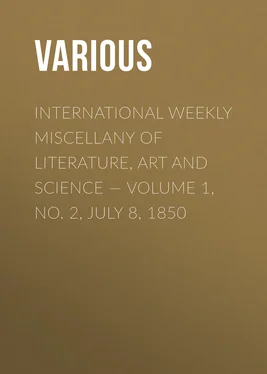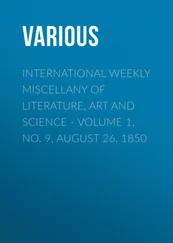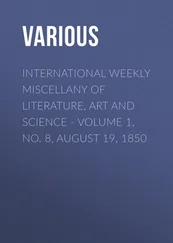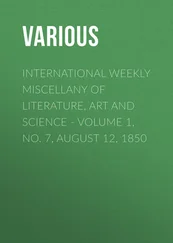Various - International Weekly Miscellany of Literature, Art and Science — Volume 1, No. 2, July 8, 1850
Здесь есть возможность читать онлайн «Various - International Weekly Miscellany of Literature, Art and Science — Volume 1, No. 2, July 8, 1850» — ознакомительный отрывок электронной книги совершенно бесплатно, а после прочтения отрывка купить полную версию. В некоторых случаях можно слушать аудио, скачать через торрент в формате fb2 и присутствует краткое содержание. Жанр: foreign_antique, periodic, foreign_edu, на английском языке. Описание произведения, (предисловие) а так же отзывы посетителей доступны на портале библиотеки ЛибКат.
- Название:International Weekly Miscellany of Literature, Art and Science — Volume 1, No. 2, July 8, 1850
- Автор:
- Жанр:
- Год:неизвестен
- ISBN:нет данных
- Рейтинг книги:5 / 5. Голосов: 1
-
Избранное:Добавить в избранное
- Отзывы:
-
Ваша оценка:
- 100
- 1
- 2
- 3
- 4
- 5
International Weekly Miscellany of Literature, Art and Science — Volume 1, No. 2, July 8, 1850: краткое содержание, описание и аннотация
Предлагаем к чтению аннотацию, описание, краткое содержание или предисловие (зависит от того, что написал сам автор книги «International Weekly Miscellany of Literature, Art and Science — Volume 1, No. 2, July 8, 1850»). Если вы не нашли необходимую информацию о книге — напишите в комментариях, мы постараемся отыскать её.
International Weekly Miscellany of Literature, Art and Science — Volume 1, No. 2, July 8, 1850 — читать онлайн ознакомительный отрывок
Ниже представлен текст книги, разбитый по страницам. Система сохранения места последней прочитанной страницы, позволяет с удобством читать онлайн бесплатно книгу «International Weekly Miscellany of Literature, Art and Science — Volume 1, No. 2, July 8, 1850», без необходимости каждый раз заново искать на чём Вы остановились. Поставьте закладку, и сможете в любой момент перейти на страницу, на которой закончили чтение.
Интервал:
Закладка:
Emma is from the German, and signifies a nurse; Caroline, from the Latin—noble minded; George, from the Greek-a farmer; Martha, from Hebrew—bitterness; the beautiful and common Mary is Hebrew, and means a drop of salt water—a tear; Sophia, from Greek—wisdom; Susan, from Hebrew—a lily; Thomas, from Hebrew—a twin; and Robert, from German—famous in council.
Authors and Books
Mr. James and Copyright.—It appears that the visit of Mr. G.P.R. James, with which we are presently to be honored, is not, after all, solely for the "gratification of the natural curiosity" of the author of the book with so many titles, as some time ago he advised one of his correspondents here. The London News observes incidentally: "The long-vexed question of an international copyright with our transatlantic cousins shows symptoms of rising to a speedy crisis. Up to a recent period the Yankees had all the advantage of the defective state of the law. They could steal freely from our literary richness; whereas, not only had they little of their own to be robbed of, but their handful of authors took very good care to secure English publishers, and, therefore, English copyrights, for their works. This defense, however, a recent law decision has wrested from the Coopers and Irvings of the States; so that English booksellers have now a perfect right to treat American authors as American booksellers have long been in the habit of serving English authors. And there is something just in this lex talionis . If Dickens, may be reprinted and sold for a shilling in New York, why may not Cooper be reprinted and sold for a shilling in London? At all events, the reprisal system will possibly incline our Yankee neighbors to listen to reason, and to favor the embassy which Mr. James, the novelist, is to undertake to the States, with a view of making preliminary arrangements for a full and satisfactory code directed against all future international literary free-booting ."
Albert Smith and "Protection."—The Spectator , misled by a statement in the Morning Post, to the effect that a Mr. Albert Smith was present, by invitation, at a Protectionist meeting at Wallingford, made some caustic remarks on the supposed adhesion of the witty novelist to the cause of dear bread. The latter, astounded thereby, sends the Spectator a note, in which he says:
"The Sphinx, at which you pleasantly affirm I came home laughing from Egypt, never propounded a darker puzzle to any of its victims than you have to me. From last week's Spectator I learn, for the first time, that I was at a Protection meeting at Wallingford on some particular day, and that I wept at the prices of 1845. Allow me to assure you that I never was at Wallingford in my life: nor, indeed, did I ever attend a public meeting anywhere. I have not the slightest notion what the prices—I presume of corn—were in 1845; and I should never think of expressing an opinion, in any way, upon politics, except against that school which abuses respectability and philanthropizes mischievous rift-raff."
R.H. Stoddard is preparing for the press of Ticknor, Reed & Fields, a collection of his Poems, to include most of those he has contributed to the periodicals since the appearance of his "Footprints," two years ago. The book will be welcomed by the lovers of genuine poetry. Mr. Stoddard is a young man of unquestionable genius, and we have been pleased to observe that there is a decided improvement from time to time in his compositions, indicating the industry and wise direction of his studies, in refinement of taste, elegance of finish, and a rapid and vigorous expansion of his imagination. His masterpiece, thus far, is The Castle in the Air , fitly praised by our neighbor of the Albion , as one of the finest productions of the present time. We do not know of any poet at home or abroad to whose fame it would not have added new luster. In the July number of the Knickerbocker we find the following "Dirge," which is not unworthy of him:
There's a new grave in the old church-yard,
Another mound in the snow;
And a maid whose soul was whiter far,
Sleeps in her shroud below.
The winds of March are piping loud,
And the snow comes down for hours;
But by-and-by the April rains
Will bring the sweet May flowers.
The sweet May flowers will cover her grave
Made green by the April rain;
But blight will lie on our memories.
And our tears will fall in vain!
Inedited Correspondence of Goethe and Schiller.—By many friends of German literature it will be remembered that Goethe, during his life, carefully preserved a particular portion of his papers and letters, which he in 1827 transferred to the government of Weimar, on the condition that the box in which they were contained should not be opened until the present year. The 17th of May was the date fixed upon, and in accordance with the will of the deceased poet, his heirs and those of his brother poet Schiller were on that day judicially summoned to Weimar to witness the opening of the case. Of Schiller's descendants there were present on the occasion, his eldest son and eldest daughter, and the widow of Ernst von Schiller. Goethe was represented by his daughter-in-law and his two grandsons, Wolfgang and Walther, who came from Vienna, their present place of residence, for the purpose. Schiller's eldest son is chief inspector of forests in Wurtemberg. Madame de Junot and Frau von Goethe were also present. The box on being opened was found to contain a full correspondence between Schiller and Goethe, ready arranged for the press. A codicil in Goethe's will provides for their publication. Most of the letters, all of Schiller's in fact, are autograph.
The Countess Ossoli, (Margaret Fuller,) we learn from the Tribune , will be in New York about the 20th of the present month. Her work on Italy will be given to the press immediately after her arrival.
Dr. Hoefer against Dr. Layard.—Dr. Hoefer, a well-known savant in France and Germany, has astonished the Parisians by the publication of a work in which he boldly denies the authenticity of the ruins of Nineveh. Even admitting, he says, that the ruins of Nineveh remain, it is impossible that they can be in the place which Dr. Layard has explored; and, moreover, the Assyrian-like sculptures and inscriptions found in the supposed Nineveh, were the work of a later, and a different people, who had the affectation of imitating Assyrian taste.
Both Rogers and Wilson, it is said, have declined the laureateship. Referring to the office, the Daily News has a very prosy simile: "A dog, of any sense or self-respect, with a tin-kettle tied to his tail, acutely feels the misery and degradation of the music he is compelled to make. What the tin-kettle is to the dog, the yearly Ode is to the muse. The board, if you please, but not the annoyance and irritation of the jangle."
Mr. George H. Boker is at present engaged in preparing for the stage his new play of "The Betrothal." A correspondent who has seen it in manuscript, and for whose critical opinion we have a very high respect, pronounces it superior, both in action, combination and development of character, and general management of the plot, to any of his previous dramatic writings. It will probably be brought out next fall, not only in this city and Philadelphia, but in London, where his tragedy of "Calaynos" had such a successful run. We believe Mr. Boker will yet demonstrate that the art of dramatic writing is not lost, nor likely to be while we retain the language of Shakspeare, Jonson and Fletcher.
Bayard Taylor will deliver the poem before the societies of Harvard College on the 18th inst. Among his predecessors have been Charles Sprague, Oliver Wendell Holmes, Edward Everett, W.C. Bryant, George Bancroft, Frederick H. Hedge, and some dozen others of the first rank in letters.
Читать дальшеИнтервал:
Закладка:
Похожие книги на «International Weekly Miscellany of Literature, Art and Science — Volume 1, No. 2, July 8, 1850»
Представляем Вашему вниманию похожие книги на «International Weekly Miscellany of Literature, Art and Science — Volume 1, No. 2, July 8, 1850» списком для выбора. Мы отобрали схожую по названию и смыслу литературу в надежде предоставить читателям больше вариантов отыскать новые, интересные, ещё непрочитанные произведения.
Обсуждение, отзывы о книге «International Weekly Miscellany of Literature, Art and Science — Volume 1, No. 2, July 8, 1850» и просто собственные мнения читателей. Оставьте ваши комментарии, напишите, что Вы думаете о произведении, его смысле или главных героях. Укажите что конкретно понравилось, а что нет, и почему Вы так считаете.












